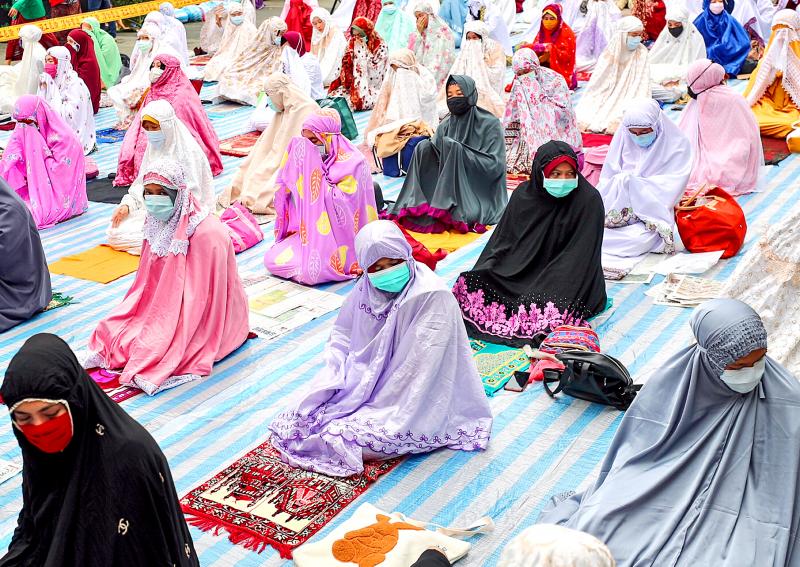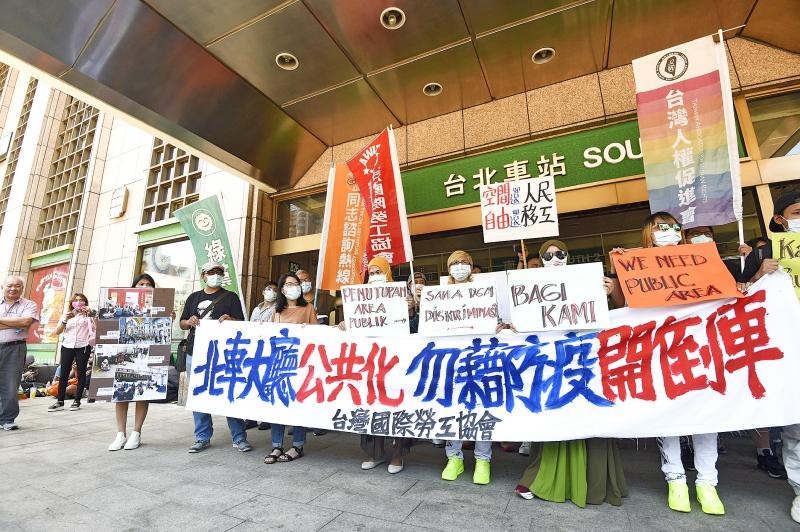The Taiwan Railways Administration (TRA) should not use the government’s disease-prevention policy as an excuse to block people’s access to the Taipei Railway Station’s main hall, the Taiwan International Workers’ Association said yesterday.
The association held a protest at the station after what organizers said were about 400 people staged a sit-in on Saturday to demonstrate against the TRA’s proposal to ban sitting on the floor of the main hall.
In accordance with the Central Epidemic Command Center’s disease-prevention measures, large gatherings have been banned in the hall since the end of February.

Photo: CNA
After protesters yesterday expressed their grievances at the southern entrance to the station, they marched toward the center of the main hall and sat down, saying they dared police to drag them away.
Station Master Huang Jung-hua (黃榮華) said that the protesters would not be fined, as they were simply expressing their opinions.
“We will include the group next week when we discuss how the public space should be used,” Huang said.

Photo: George Tsorng, Taipei Times
The railway agency distributed bottled water to people at the railway station, most of whom sat around the pillars in the main hall.
The Ministry of Transportation and Communications and the TRA last week said that the main hall would be open to the public after the COVID-19 outbreak is brought under control, although they would set rules on how the main hall should be properly used.
Until then, the hall would remain closed to public events, including yesterday’s Eid al-Fitr celebrations, they said.
Association representative Chen Hsiu-lien (陳秀蓮) said that the issues of where migrant workers should go to celebrate Eid al-Fitr and whether migrant workers could gather at Taipei Railway Station for such an event are covered by the media whenever the Muslim festival approaches.
Rather than focusing on whether migrant workers should be allowed to sit in the main hall on holidays or during Eid al-Fitr, Chen said that the public should focus on how the railway agency has exploited a public space for monetary gain.
After the agency outsourced management of the station mainly to the Breeze Center, government agencies or non-profit organizations would need to pay NT$40,000 to NT$120,000 to host events in the main hall, whereas private organizations or schools would have to pay NT$60,000 to NT$500,000, she said.
“The agency has been telling people that the main hall was not designed for people to sit on the floor. What it did not say was that people can do so, they will only have to pay for it,” she said.
An Indonesian migrant worker named Wiwin said that many migrant workers are carers whose salaries did not meet the minimum wage.
It is impossible for migrant workers to regularly frequent restaurants on the second floor of the station so that they can have a place to sit, she said.
“Most of us have less than a day to ourselves and can only meet at large transport hubs. As such, the main hall at the Taipei Railway Station is an important place for us,” she said.
“Citizens of this country need a place to sit as well, but why do people always use migrant workers as a reason when they enforce a policy? Why would our sitting in the main hall impede the foot traffic inside the train station, but a large event at the main hall would not?” she asked.
Yang You-ren (楊友仁), a sociology professor at Tunghai University, said that the main hall is one of the rare places in the nation where people can freely exchange their ideas and observations.
Imposing a sitting ban would be like bringing back martial law, Yang said, adding that the government should maintain social diversity by encouraging people to communicate in public spaces.

Chinese Nationalist Party (KMT) Chairman Eric Chu (朱立倫), spokeswoman Yang Chih-yu (楊智伃) and Legislator Hsieh Lung-chieh (謝龍介) would be summoned by police for questioning for leading an illegal assembly on Thursday evening last week, Minister of the Interior Liu Shyh-fang (劉世芳) said today. The three KMT officials led an assembly outside the Taipei City Prosecutors’ Office, a restricted area where public assembly is not allowed, protesting the questioning of several KMT staff and searches of KMT headquarters and offices in a recall petition forgery case. Chu, Yang and Hsieh are all suspected of contravening the Assembly and Parade Act (集會遊行法) by holding

PRAISE: Japanese visitor Takashi Kubota said the Taiwanese temple architecture images showcased in the AI Art Gallery were the most impressive displays he saw Taiwan does not have an official pavilion at the World Expo in Osaka, Japan, because of its diplomatic predicament, but the government-backed Tech World pavilion is drawing interest with its unique recreations of works by Taiwanese artists. The pavilion features an artificial intelligence (AI)-based art gallery showcasing works of famous Taiwanese artists from the Japanese colonial period using innovative technologies. Among its main simulated displays are Eastern gouache paintings by Chen Chin (陳進), Lin Yu-shan (林玉山) and Kuo Hsueh-hu (郭雪湖), who were the three young Taiwanese painters selected for the East Asian Painting exhibition in 1927. Gouache is a water-based

Taiwan would welcome the return of Honduras as a diplomatic ally if its next president decides to make such a move, Minister of Foreign Affairs Lin Chia-lung (林佳龍) said yesterday. “Of course, we would welcome Honduras if they want to restore diplomatic ties with Taiwan after their elections,” Lin said at a meeting of the legislature’s Foreign Affairs and National Defense Committee, when asked to comment on statements made by two of the three Honduran presidential candidates during the presidential campaign in the Central American country. Taiwan is paying close attention to the region as a whole in the wake of a

OFF-TARGET: More than 30,000 participants were expected to take part in the Games next month, but only 6,550 foreign and 19,400 Taiwanese athletes have registered Taipei city councilors yesterday blasted the organizers of next month’s World Masters Games over sudden timetable and venue changes, which they said have caused thousands of participants to back out of the international sporting event, among other organizational issues. They also cited visa delays and political interference by China as reasons many foreign athletes are requesting refunds for the event, to be held from May 17 to 30. Jointly organized by the Taipei and New Taipei City governments, the games have been rocked by numerous controversies since preparations began in 2020. Taipei City Councilor Lin Yen-feng (林延鳳) said yesterday that new measures by